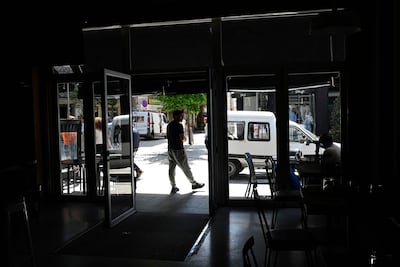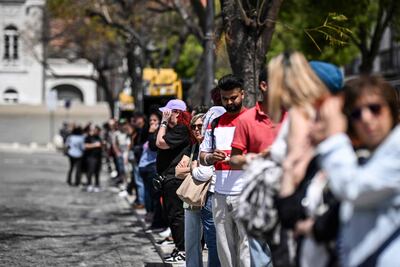Restoring electricity to large parts of the Spanish power grid after a huge and unprecedented power outage on Monday that also hit Portugal could take six to 10 hours, Spanish power distributor Red Electrica said.
The Portuguese Cabinet convened an emergency meeting at the prime minister’s residence, and Spanish Prime Minister Pedro Sánchez visited power distributor Red Electrica to follow efforts at restoring grid operations.
Eduardo Prieto, head of operations at Red Electrica, said the event was “exceptional and extraordinary”.
The company declined to speculate on the causes of the blackout. The Portuguese National Cybersecurity Centre said there was no sign the power cut was due to a cyber attack and blamed a "rare atmospheric phenomenon".
The power outage hit across Spain and Portugal, including their capitals. In some regions, trains were evacuated, traffic lights were out, and shops and restaurants were plunged into darkness. The internet was also affected and mobile phone networks were reportedly down in Spain as well as ATMs.
A resident in Lisbon told The National that “electric doors don’t open. People are stuck in their offices. Internet is also very on and off. Can barely send WhatsApp messages and can’t check the news”.
Spain’s public broadcaster RTVE said the power cut hit several regions of the country just after midday local time, leaving its newsroom and Spain’s parliament in Madrid in the dark.
In Madrid – the capital of Spain – Mayor José Luis Martínez-Almeida has warned residents to stay put, while airline TAP Air in Portugal has told passengers not to travel to airports until further notice.
Video aired on Spanish television showed people evacuating metro stations in Madrid and empty stations with trains stopped in Barcelona.
Play at the Madrid Open tennis tournament was suspended. Three matches were under way when power went down.
Authorities said the cause was not immediately known, though one Portuguese official said the problem appeared to be with the electricity distribution network in Spain.
The countries have a combined population of more than 50 million people. It was not immediately clear how many were affected. It is rare to have such a widespread power cut across the Iberian Peninsula.
A couple of hours later, Spain’s electricity network operator said it was recovering power in the north and south of the peninsula, which would help to progressively restore the electricity supply nationwide.
Portugal’s government said the power cut appeared to stem from problems outside the country, an official told national news agency Lusa.
“It looks like it was a problem with the distribution network, apparently in Spain. It’s still being ascertained,” Cabinet Minister Leitão Amaro was quoted as saying.
Portuguese distributor E-Redes said the power cut was due to “a problem with the European electricity system”, according to Portuguese newspaper Expresso. The company said it was compelled to cut power in specific areas to stabilise the network, according to Expresso.
Spain’s traffic department asked citizens to avoid using their cars as much as possible due to the power cut, which has affected traffic lights and electrical road signage.
In Terrassa, an industrial town 50km from Barcelona, stores selling generators were out of stock after people lined up to buy them.
Portugal’s E-Redes said parts of France also were affected.
In a country of about 10.6 million people, the power cut hit the capital, Lisbon, and surrounding areas, as well as northern and southern parts. Portuguese police placed more officers on duty to direct traffic and cope with increased requests for help, including from people trapped in elevators.
Portuguese hospitals and other emergency services switched to generators. Petrol stations stopped working and trains stopped running.
Portugal’s National Authority for Emergencies and Civil Protection said backup power systems were operating.
Despacito's dominance in numbers
Released: 2017
Peak chart position: No.1 in more than 47 countries, including the United States, the United Kingdom, Australia and Lebanon
Views: 5.3 billion on YouTube
Sales: With 10 million downloads in the US, Despacito became the first Latin single to receive Diamond sales certification
Streams: 1.3 billion combined audio and video by the end of 2017, making it the biggest digital hit of the year.
Awards: 17, including Record of the Year at last year’s prestigious Latin Grammy Awards, as well as five Billboard Music Awards
HAJJAN
%3Cp%3EDirector%3A%20Abu%20Bakr%20Shawky%C2%A0%3C%2Fp%3E%0A%3Cp%3E%3Cbr%3EStarring%3A%20Omar%20Alatawi%2C%20Tulin%20Essam%2C%20Ibrahim%20Al-Hasawi%C2%A0%3C%2Fp%3E%0A%3Cp%3E%3Cbr%3ERating%3A%204%2F5%3C%2Fp%3E%0A
Dhadak
Director: Shashank Khaitan
Starring: Janhvi Kapoor, Ishaan Khattar, Ashutosh Rana
Stars: 3
Red flags
- Promises of high, fixed or 'guaranteed' returns.
- Unregulated structured products or complex investments often used to bypass traditional safeguards.
- Lack of clear information, vague language, no access to audited financials.
- Overseas companies targeting investors in other jurisdictions - this can make legal recovery difficult.
- Hard-selling tactics - creating urgency, offering 'exclusive' deals.
Courtesy: Carol Glynn, founder of Conscious Finance Coaching
Dubai Bling season three
Cast: Loujain Adada, Zeina Khoury, Farhana Bodi, Ebraheem Al Samadi, Mona Kattan, and couples Safa & Fahad Siddiqui and DJ Bliss & Danya Mohammed
Rating: 1/5
Where can I submit a sample?
Volunteers can now submit DNA samples at a number of centres across Abu Dhabi. The programme is open to all ages.
Collection centres in Abu Dhabi include:
- Abu Dhabi National Exhibition Centre (ADNEC)
- Biogenix Labs in Masdar City
- Al Towayya in Al Ain
- NMC Royal Hospital in Khalifa City
- Bareen International Hospital
- NMC Specialty Hospital, Al Ain
- NMC Royal Medical Centre - Abu Dhabi
- NMC Royal Women’s Hospital.
Abu Dhabi racecard
5pm: Maiden (Purebred Arabians); Dh80,000; 1,400m.
5.30pm: Maiden (PA); Dh80,00; 1,400m.
6pm: Sheikh Zayed bin Sultan Al Nahyan National Day Cup (PA); Group 3; Dh500,000; 1,600m.
6.30pm: Sheikh Zayed bin Sultan Al Nahyan National Day Cup (Thoroughbred); Listed; Dh380,000; 1,600m
7pm: Wathba Stallions Cup for Private Owners Handicap (PA); Dh70,000; 1,400m.
7.30pm: Handicap (PA); Dh80,000; 1,600m
Indoor cricket in a nutshell
Indoor cricket in a nutshell
Indoor Cricket World Cup - Sept 16-20, Insportz, Dubai
16 Indoor cricket matches are 16 overs per side
8 There are eight players per team
9 There have been nine Indoor Cricket World Cups for men. Australia have won every one.
5 Five runs are deducted from the score when a wickets falls
4 Batsmen bat in pairs, facing four overs per partnership
Scoring In indoor cricket, runs are scored by way of both physical and bonus runs. Physical runs are scored by both batsmen completing a run from one crease to the other. Bonus runs are scored when the ball hits a net in different zones, but only when at least one physical run is score.
Zones
A Front net, behind the striker and wicketkeeper: 0 runs
B Side nets, between the striker and halfway down the pitch: 1 run
C Side nets between halfway and the bowlers end: 2 runs
D Back net: 4 runs on the bounce, 6 runs on the full
Brief scoreline:
Manchester United 2
Rashford 28', Martial 72'
Watford 1
Doucoure 90'
Results
6.30pm: Al Maktoum Challenge Round-2 Group 1 (PA) US$75,000 (Dirt) 1,900m
Winner: Ziyadd, Richard Mullen (jockey), Jean de Roualle (trainer).
7.05pm: Al Rashidiya Group 2 (TB) $250,000 (Turf) 1,800m
Winner: Barney Roy, William Buick, Charlie Appleby.
7.40pm: Meydan Cup Listed Handicap (TB) $175,000 (T) 2,810m
Winner: Secret Advisor, Tadhg O’Shea, Charlie Appleby.
8.15pm: Handicap (TB) $175,000 (D) 1,600m
Winner: Plata O Plomo, Carlos Lopez, Susanne Berneklint.
8.50pm: Handicap (TB) $135,000 (T) 1,600m
Winner: Salute The Soldier, Adrie de Vries, Fawzi Nass.
9.25pm: Al Shindagha Sprint Group 3 (TB) $200,000 (D) 1,200m
Winner: Gladiator King, Mickael Barzalona, Satish Seemar.
The specs
Engine: 3.8-litre V6
Power: 295hp at 6,000rpm
Torque: 355Nm at 5,200rpm
Transmission: 8-speed auto
Fuel consumption: 10.7L/100km
Price: Dh179,999-plus
On sale: now
COMPANY PROFILE
Name: Kumulus Water
Started: 2021
Founders: Iheb Triki and Mohamed Ali Abid
Based: Tunisia
Sector: Water technology
Number of staff: 22
Investment raised: $4 million
Groom and Two Brides
Director: Elie Semaan
Starring: Abdullah Boushehri, Laila Abdallah, Lulwa Almulla
Rating: 3/5
How to apply for a drone permit
- Individuals must register on UAE Drone app or website using their UAE Pass
- Add all their personal details, including name, nationality, passport number, Emiratis ID, email and phone number
- Upload the training certificate from a centre accredited by the GCAA
- Submit their request
What are the regulations?
- Fly it within visual line of sight
- Never over populated areas
- Ensure maximum flying height of 400 feet (122 metres) above ground level is not crossed
- Users must avoid flying over restricted areas listed on the UAE Drone app
- Only fly the drone during the day, and never at night
- Should have a live feed of the drone flight
- Drones must weigh 5 kg or less
Fight card
- Aliu Bamidele Lasisi (Nigeria) beat Artid Vamrungauea (Thailand) POINTS
- Julaidah Abdulfatah (Saudi Arabia) beat Martin Kabrhel (Czech Rep) POINTS
- Kem Ljungquist (Denmark) beat Mourad Omar (Egypt) TKO
- Michael Lawal (UK) beat Tamas Kozma (Hungary) KO
- Zuhayr Al Qahtani (Saudi Arabia) beat Mohammed Mahmoud (UK) POINTS
- Darren Surtees (UK) beat Kane Baker (UK) KO
- Chris Eubank Jr (UK) beat JJ McDonagh (Ireland) TKO
- Callum Smith (UK) beat George Groves (UK) KO
The bio
Academics: Phd in strategic management in University of Wales
Number one caps: His best-seller caps are in shades of grey, blue, black and yellow
Reading: Is immersed in books on colours to understand more about the usage of different shades
Sport: Started playing polo two years ago. Helps him relax, plus he enjoys the speed and focus
Cars: Loves exotic cars and currently drives a Bentley Bentayga
Holiday: Favourite travel destinations are London and St Tropez
The%20Genius%20of%20Their%20Age
%3Cp%3EAuthor%3A%20S%20Frederick%20Starr%3Cbr%3EPublisher%3A%20Oxford%20University%20Press%3Cbr%3EPages%3A%20290%3Cbr%3EAvailable%3A%20January%2024%3C%2Fp%3E%0A
Our legal columnist
Name: Yousef Al Bahar
Advocate at Al Bahar & Associate Advocates and Legal Consultants, established in 1994
Education: Mr Al Bahar was born in 1979 and graduated in 2008 from the Judicial Institute. He took after his father, who was one of the first Emirati lawyers
More from Neighbourhood Watch
THE SPECS
Engine: Four-cylinder 2.5-litre
Transmission: Seven-speed auto
Power: 165hp
Torque: 241Nm
Price: Dh99,900 to Dh134,000
On sale: now
Fixtures
50-over match
UAE v Lancashire, starts at 10am
Champion County match
MCC v Surrey, four-day match, starting on Sunday, March 24, play starts at 10am
Both matches are at ICC Academy, Dubai Sports City. Admission is free.
'Falling%20for%20Christmas'
%3Cp%3EDirector%3A%20Janeen%20Damian%3Cbr%3E%3Cbr%3EStars%3A%20Lindsay%20Lohan%2C%20Chord%20Overstreet%2C%20Jack%20Wagner%2C%20Aliana%20Lohan%3Cbr%3E%3Cbr%3ERating%3A%201%2F5%3C%2Fp%3E%0A
Three ways to boost your credit score
Marwan Lutfi says the core fundamentals that drive better payment behaviour and can improve your credit score are:
1. Make sure you make your payments on time;
2. Limit the number of products you borrow on: the more loans and credit cards you have, the more it will affect your credit score;
3. Don't max out all your debts: how much you maximise those credit facilities will have an impact. If you have five credit cards and utilise 90 per cent of that credit, it will negatively affect your score.
Know your Camel lingo
The bairaq is a competition for the best herd of 50 camels, named for the banner its winner takes home
Namoos - a word of congratulations reserved for falconry competitions, camel races and camel pageants. It best translates as 'the pride of victory' - and for competitors, it is priceless
Asayel camels - sleek, short-haired hound-like racers
Majahim - chocolate-brown camels that can grow to weigh two tonnes. They were only valued for milk until camel pageantry took off in the 1990s
Millions Street - the thoroughfare where camels are led and where white 4x4s throng throughout the festival



